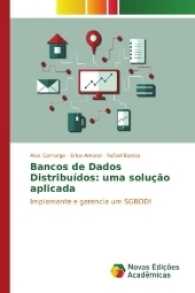Full Description
Among the rural Embu people of Eastern Kenya, teaching and learning are not purely institutional activities. Instead, knowledge is passed from generation to generation alongside the most mundane activities. In Indigenous African Knowledge Production, Njoki Nathani Wane uses food-processing practices - preparing, preserving, cooking, and serving - as an entry point into the indigenous knowledge of the Embu and the role that rural Embu women play in creating and transmitting it.
Using personal narratives collected during several years of field research in Kenya, Wane demonstrates how Embu women use proverbs, fables, and folktales to preserve and communicate their world-view, knowledge, and cultural norms. She shows how this process preserves Indigenous knowledge devalued by the colonial and post-colonial educational systems, as well as the gendered dimension of the transmission process.
Wane's book will be useful not just to those studying development and education in Africa, but also to all those interested in questions of how to preserve and recover local cultural knowledge.
Contents
Acknowledgements
Foreward by George J. Sefa Dei (University of Toronto, Sociology and Equity Studies)
Map of Kenya
Introduction
Chapter One - Food Processing: Embu and Indigenous Knowledges
Chapter Two - Kenya: The Land, the People, and the Socio-Political Economy
Chapter Three - The Everyday Experiences of Embu Women
Chapter Four - Food Preservation and Change
Chapter Five - Gender Relations; Decision Making & Food Preferences
Chapter Six - Indigenous Technology & the Influence of New Innovations
Chapter Seven - Removing the Margins: Including Indigenous Women's Voices in Knowledge Roduction
Chapter Eight - Contesting Knowledge: Some Concluding Thoughts
Endnotes
References








